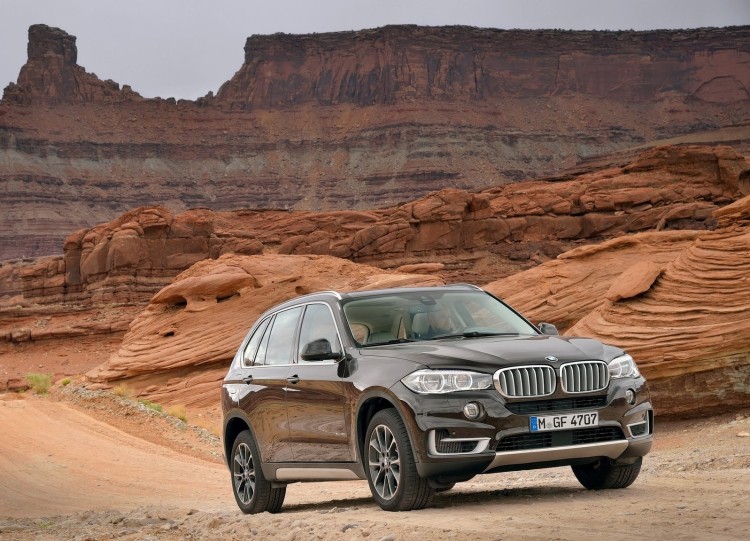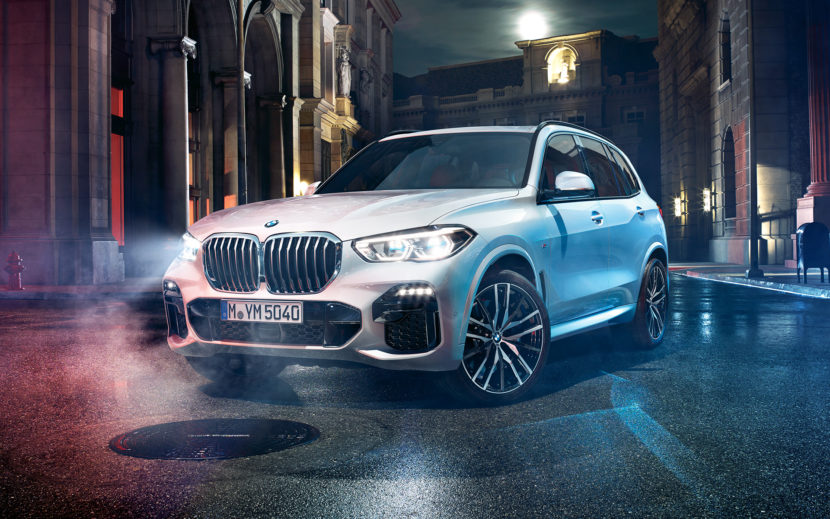The BMW X5 has been in manufacturing because the early 2000s. It’s the primary SUV the model delivered to market, and wasn’t instantly a crucial success. That tune has modified by way of the truck’s quarter-century run, because the model obtained higher acquainted with constructing SUVs and buyer expectations. In actual fact, the BMW X5 is constantly one of many model’s prime performers. In 2024, the X5 and its sportier twin the X6 bought 275,318 items mixed. That’s greater than 10 % of the model’s complete world gross sales. Because the X5 ages and depreciates, it turns into an much more thrilling prospect for customers making an attempt to ostensibly get probably the most for his or her cash. Let’s simply say some generations are a safer guess than others.
First Technology BMW X5 (E53)
The primary technology of the BMW X5, the E53, was in manufacturing between 2000 and 2006. All E53 X5s are all-wheel drive. The US market solely noticed naturally aspirated fuel engines in inline-six and V8 configuration, and the M54 inline-six is the one you need for long-term sturdiness. The M54 is a staple of the BMW lineup. Whilst you can count on some “previous BMW” issues (repeatedly changing the coolant system, DISA valve, oil filter housing gasket leaks), the M54-powered X5 is actually probably the most dependable of the primary technology X5.
For those who completely should have a V8 in your first-gen X5, the early M62 V8 (2000-2003 mannequin yr) is the safer guess. After 2003, BMW caught the N62 beneath the hood of the 4.4i and 4.8is fashions. The worst of the bunch is the N62, usually affected by valve steam seal failure, leaking valve cowl, timing cowl, and alternator bracket gaskets, coolant leaks, and SAIS (secondary air injection system) failure. The simpler M62 additionally has issues, like VANOS points and failing timing chain guides, however they’re typically simpler to plan for through preventative upkeep. We wouldn’t suggest rolling the cube on a V8 E53 except it’s an M62.
There are a variety of different persistent points that maintain the E53 again from being thought-about one of many extra dependable methods to pilot an X5. Since they’re all all-wheel drive, there’s inherently a bit bit extra complexity than a two-wheel drive model. All V8 fashions (and plenty of inline-six powered fashions) have some type of early air suspension/self-leveling suspension (SLS), which is usually a troubleshooting nightmare. Decide up an M54-powered E53 with a stick shift for added novelty and probably the most dependable expertise attainable (typically).
Second Technology BMW X5 (E70)
The second technology of the BMW X5, the E70, was produced from 2007 till 2013. Like its predecessor, E70s can be found solely in all-wheel drive, however the US market lastly will get to take pleasure in a diesel engine. The diesel we obtained is dubbed the M57, and it’s a reasonably stout mill — so long as you’re keen to shell out 1000’s of {dollars} to maintain the emissions management methods working easily. There are methods across the system, in fact, however you’ll want to search out these discussions elsewhere.
For those who’re sticking with fuel energy, there’s excellent news. The E70 obtained a ton of nice engines all through its life cycle, together with the superb N52 inline-six, the final naturally aspirated six from BMW. These 3.0-liter mills are successors to the M54-powered X5s, they usually largely stick with it the custom of resilience. One other glorious inline-six accessible to E70 customers is the N55. Primarily, you may commerce peace of thoughts for a substantial energy bump. The N55 within the E70 makes simply over 300 horsepower and 295 pound-feet of torque. But it surely’s not with out flaws: cost pipe failure is a close to assure, and over a protracted sufficient timeline you’ll probably have to confront points surrounding the high-pressure gasoline pump (HPFP), oil filter housing gasket, and cooling system (significantly the water pump).
Three totally different V8 engines present up beneath the hood of the second-gen X5: earlier 4.8i/xDrive48i fashions obtained an N62, whereas later E70 vans obtained an up to date N63 energy plant. Then there’s the first-ever X5 M, which utilized an S63. We’ll once more suggest you keep away from N62-powered fashions. The N63 and S63 introduce turbocharging, which is a portion of why we are able to’t probably suggest the N63-powered X5 as a dependable decide.
Failing turbos, excessive oil consumption, and (but once more) failing valve steam seals make the N63 simply as a lot of a headache because the N62. The S63, then again, a minimum of eliminates the turbocharger points, and is usually seen as extra dependable. In terms of the second gen X5, we’re extremists: keep on with a primary N52-powered automotive or full ship on the S63-powered X5 M; there are higher choices elsewhere within the X5 lineage for middle-grounders.
Third Technology BMW X5 (F15 and F85)
The third technology of the BMW X5 was produced from 2013 till simply 2018. Regardless of the brief run, there are a dizzying variety of choices to select from. Together with fuel inline-six and V8 choices (each turbocharged), BMW continued to supply a diesel and even launched a plug-in hybrid 40e variant. The F85 chassis code identifies the second-ever X5 M which was based mostly closely on the usual F15 chassis. The diesel is upgraded to the N57 unit and is just like the M57 within the sense that reliability is contingent upon sustaining or discarding the emissions management system. We don’t suggest it except you may have both of these choices at your disposal.
The hybrid X5 xDrive40e is engaging, because the PHEV depreciation curve is steep, and you might save a bit bit on fuel. Nonetheless, there are some pitfalls. Whereas the N20 engine is pretty dependable on this software, components for {the electrical} elements are nonetheless costly and labor-intensive. It isn’t a very simple mannequin to analysis, both. On the very least, guarantee is suggested. The N55 is basically a carryover engine from the earlier technology. Nonetheless, the N63 V8 noticed a considerably up to date N63 (“N63TU”) that drove up efficiency figures and considerably modified how the engine performs. A litany of recent components make it really worthy of consideration right here; though failing turbos and valve stem seals persist. The X5 M (dubbed F85 right here) makes use of an additional up to date S63, too, the S63B44T2. Although, virtually, little adjustments — it’s nonetheless decide total.
General, the third technology BMW X5 has loads going for it by way of reliability. Whenever you additional contemplate an accessible rear-wheel drive configuration (N55-powered automobiles solely), additional lowering the variety of issues you may break, it seems to be like a compelling selection. And, in truth, we expect it’s: buying a third-gen X5 is about as secure of a guess as you may get, significantly should you don’t have the cash for a brand new one. Notably, it’s additionally the primary technology not fully affected by the dreaded Takata airbag recall (affected mannequin years minimize off at 2014).
Fourth Technology BMW X5 (G05 and F95)
The most present X5 technology can also be probably the most dependable. The star of the present is the B58 inline-six, accessible I the X5 xDrive40/sDrive40 fashions. Not solely is the B58 proving to be extra dependable total than its N55 predecessors, the inline-six has additionally confirmed up in actually thousands and thousands of BMW autos, making components plentiful and analysis simple. A rear-driven B58 G05 X5 will take you very far, and we have now no reservations about recommending it as probably the most dependable X5 you should purchase. The N63 returns with much more substantial adjustments that make it, too, probably the most dependable iteration but; in fact, as some could already know, late V8 fashions (X5 M60i) ditch the N63 fully in favor of an S68 lifted straight out of the M fashions. Sadly the S68 is a bit bit too new to have concrete knowledge factors; we think about will probably be fairly stout, however the built-in delicate hybrid elements would possibly make repairs costly.
Because the PHEV fashions on this technology depend on a B58 as an alternative of the previous four-cylinder, they proceed to be a horny prospect. Whereas early reviews are inclined to skew dependable, we’d tread rigorously: battery elements are costly to interchange and discovering somebody aside from the vendor keen to work on it is perhaps difficult relying on the place you reside. The F95 X5 M makes use of both the S63 (2020-2023) or S68 (2024+) engine, each of which we’ve lined elsewhere at this level.
Which BMW X5 Technology is the Most Dependable?
Typically, the latest X5 you may afford is probably the most dependable. We predict the second-generation X5 is on common the least secure guess, though it’s very shut between the primary and second technology. The good factor about X5 reliability, total, is that points are principally confined to what’s beneath the hood. Inside high quality and even iDrive elements appear to have a low failure fee throughout the board, though older fashions will probably nonetheless profit from a window regulator checkup earlier than shopping for. In the end, any BMW X5 is usually a reliable automobile with correct upkeep and an intensive inspection earlier than buy, particularly when choosing one with a powerful service historical past. Maintain out for one and also you gained’t be upset.






